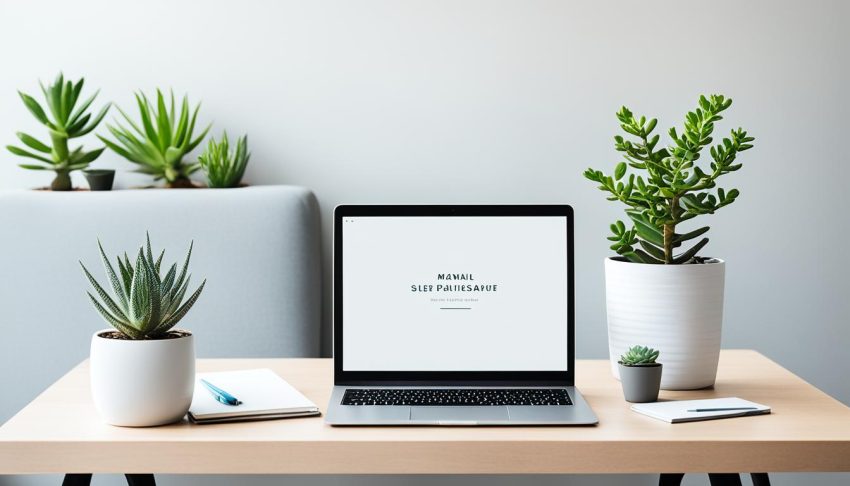Imagine living without the weight of too many things. Every item you own has a purpose and makes you happy. This is what minimalism is all about. It’s becoming very popular.
A recent survey found that 72% of people felt better mentally after decluttering their homes. Minimalism offers many benefits. It can make you less stressed and anxious, more productive, and even give you more money.
Studies show that minimalists save about 30% of their monthly income. This is compared to those who love buying lots of stuff.
Key Takeaways
- Minimalism can reduce stress and anxiety by creating physical, mental, and emotional space.
- Adopting a minimalist lifestyle can lead to significant financial savings by curbing unnecessary spending.
- Minimalism promotes sustainability by encouraging conscious consumption and reduced waste.
- Decluttering and simplifying one’s possessions can enhance mental clarity and focus.
- Minimalist living can foster a greater sense of well-being and appreciation for the essentials.
What is Minimalism?

Minimalism is a way of living that values simplicity and purpose. It’s about focusing on what’s truly important. This lifestyle is seen in design, fashion, and art, aiming for a clean, simple look.
At its heart, minimalism means getting rid of the extra to appreciate what’s essential. It’s about simplifying your stuff, your commitments, and your life. This way, you focus on what’s truly meaningful.
The Essence of Minimalist Living
Minimalism is more than decluttering. It’s a mindset that helps you make intentional choices. By living minimally, you can boost your productivity, focus, and well-being. You might even save money.
Many Millennials are choosing a minimalist life to simplify their world. This approach has changed many lives, making them more disciplined and thoughtful in their choices. Decluttering and living minimally can make spaces look and feel better. It also makes finding things easier and reduces the stress of making decisions.
“Minimalism is a tool to rid yourself of life’s excess in favor of focusing on what’s important – so you can find happiness, fulfillment, and freedom.”
Living minimally encourages you to think deeply about what you value most. Some find it hard to start or keep up with minimalism, especially in social situations. Gift-giving and receiving can also be tricky for minimalists, leading to misunderstandings and hurt feelings.
Many think minimalism means having a certain look, like white walls or Scandinavian design. But minimalism is a personal journey. It’s about finding a balance that suits you best.
Reduced Stress and Anxiety

Living a minimalist life can greatly reduce stress and anxiety. Studies show a link between clutter and stress hormones like cortisol. Women with clutter had higher cortisol levels at the end of the day. But, tidy homes led to better moods and lower cortisol levels.
Minimalism isn’t just about clean spaces. It helps clear your mind and bring calm. People with minimalist homes feel less stressed and happier. This is because these spaces are peaceful and quiet.
Minimalism also helps with money worries. Cutting unnecessary costs and spending wisely can make you feel financially free. This reduces stress. Plus, having fewer things means less time cleaning, which helps manage your time better. This leads to less stress and anxiety.
More people are turning to minimalism to fight anxiety. It’s clear that living simply helps reduce stress. This shows how important a clutter-free life is for our mental health.
“Minimalism is not just about the removal of physical possessions, but the cultivation of mental clarity and emotional well-being.” – Joshua Becker, Founder of Becoming Minimalist
Increased Productivity and Focus

In today’s world, clutter affects our brain a lot. Studies show that too many objects make our brain work harder to ignore them. This leads to feeling tired and less productive. But, simplifying our space helps us focus and process information better.
The Cognitive Impact of Clutter
Clutter makes it hard to stay productive and focused. By decluttering, we free up our minds. This lets us focus better and live a simpler life.
Embracing minimalism changes how we concentrate and stay on track. Without distractions, our brains work better. This means we’re more productive and in control of our work.
“Clutter is not just physical stuff, but anything that gets between you and the life you want to be living.”- Peter Walsh, organizational expert and author
By choosing what we keep, we make our spaces more focused and productive. This leads to clearer thinking, better decisions, and feeling accomplished in our daily tasks.
A minimalist lifestyle also helps us beyond just one task. It reduces distractions and brings order. This leads to deeper focus, engagement, and more fulfilling activities. Starting with our surroundings and thoughts helps us be more productive and focused.
Financial Freedom

Living a minimalist life can bring a clear view of your finances. It lets you spend on what’s important to you. By knowing the difference between what you want and need, you make smarter choices with your money. This leads to spending less and saving more.
Getting rid of things you don’t need can also help your wallet. You can make money by selling or giving away items you no longer use. Plus, minimalism saves you time by cutting down on clutter. This means you can enjoy life more and improve your financial health.
Choosing a minimalist fashion style means having a wardrobe with pieces that last a long time. This saves you time picking outfits and cuts down on buying new clothes. It helps you pay off debt and become financially independent by spending less on things you don’t need.
At the heart of minimalism is finding happiness in simple things. It’s about feeling fulfilled without needing lots of stuff. By living this way, you gain true financial freedom. You’re free from the stress of buying too much and can focus on what’s really important to you.
| Benefit | Description |
|---|---|
| Reduced Expenses | Minimalism helps in distinguishing between wants and needs, leading to more conscious spending decisions and a reduction in unnecessary expenses. |
| Increased Savings | By cutting back on purchases and finding satisfaction in what you already have, minimalism can help you save significantly more money. |
| Debt Repayment | A minimalist lifestyle supports debt repayment and financial independence by minimizing unnecessary expenses and redirecting funds towards building a secure financial foundation. |
| Time Efficiency | Minimalism frees up time by reducing physical and mental clutter, enabling individuals to focus on meaningful experiences and relationships. |
“Minimalism is not about having less, it’s about making room for more of what matters.”
Less Cleaning and Tidying

Living a minimalist life can cut down the time you spend cleaning and organizing. With fewer items, there’s less to keep up with. A study found that getting rid of clutter can reduce housework by up to 40 percent.
Less cleaning and tidying means more than just saving time. A clean space helps you focus better and be more productive. It also makes you feel calmer and less stressed.
| Metric | Minimalist Households | Non-Minimalist Households |
|---|---|---|
| Weekly Cleaning Time | 6 hours | 10 hours |
| Annual Household Expenses | $42,000 | $55,000 |
| Stress Levels | Moderate | High |
Living minimally gives you more time and resources for what’s important. You can spend more time with family, enjoy hobbies, or just relax. This can greatly improve your well-being and life quality.
“Minimalism is the intentional promotion of the things we most value and the removal of anything that distracts us from it.”
– Joshua Becker, Founder of Becoming Minimalist
Choosing a minimalist way of life means having more free time. It means less cleaning and tidying. And it brings benefits like more productivity, less stress, and a better sense of well-being.
Benefits of adopting a minimalist lifestyle

Minimalism means different things to everyone. Yet, it brings many benefits. It helps people live simpler and more purposefully. This leads to better well-being, finances, and the planet.
One big plus of minimalism is reduced stress and anxiety. With fewer things and a tidy space, people feel calmer. Studies show it can lower stress and boost mental health.
Minimalism also means increased productivity and focus. Less clutter makes it easier to find things and get work done. This helps people focus better on their work, hobbies, and relationships.
It can also lead to financial freedom. Spending less on stuff and more on experiences saves money. This can help pay off debts and plan for the future. It gives people more control over their money.
Plus, minimalism means less cleaning and tidying. With fewer items, there’s less to clean. This gives people more time for fun and a tidy home. It’s great for busy families or those who love their free time.
At the end, minimalism changes life more than just what we own. It makes people feel better, connect deeper with others, and care for the earth more.
“Minimalism is the intentional promotion of the things we most value and the removal of everything that distracts us from it.”
– Joshua Becker, author and minimalist
Minimalism offers many perks, like less stress, more productivity, and more freedom. By focusing on what’s important, people can live more fully and on purpose.
Greater Sense of Well-Being
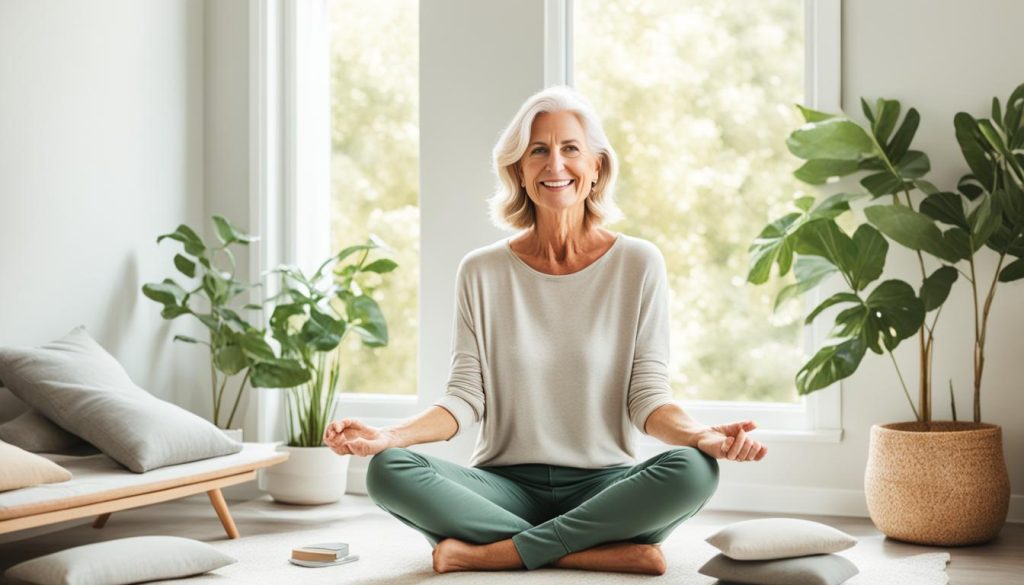
Living a minimalist life can deeply change how you feel. Studies show that minimalism links to more happiness, positive feelings, and better mental health. By cleaning up your space and focusing on what’s important, you feel more in control and content.
Minimalism and Positive Emotions
People who choose to simplify their lives feel happier and more fulfilled. Research shows they have more freedom, skill, and clear thinking. These benefits lead to more joy, peace, and satisfaction with life.
Less stuff means less mental mess, making it easier to focus and less stress. This helps you enjoy the now more and appreciate life’s simple joys.
Documentaries like “Minimalism: A Documentary About the Important Things” and “The Minimalists: Less is Now” share how living simply can make you feel better.
“Simplicity is the ultimate sophistication.” – Leonardo da Vinci
Decluttering and simplifying can make you feel free and in charge. It helps you stick to what you value most. This can lead to better mental health, less worry, and feeling better overall.
Minimalism can make life happier and more meaningful. It encourages positive feelings, boosts satisfaction, and supports mental health and well-being.
Deeper, More Focused Play for Children
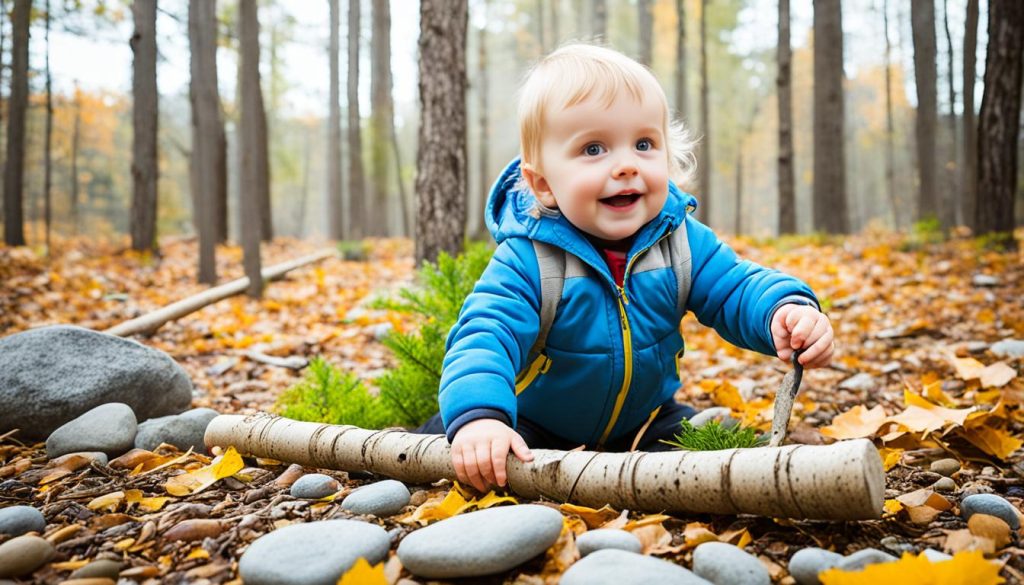
In today’s world, kids often face a flood of toys and digital screens. Yet, research shows that a minimalist lifestyle can be good for families. It suggests that having fewer children’s toys can make playtime deeper and more focused.
A study at the University of Toledo found interesting results. Kids with just four toys played longer with one toy and were more creative. They played better than kids with 16 toys. This shows that fewer toys help kids focus and be more creative.
The idea of a “minimalist lifestyle” is not just about having fewer toys. It’s about choosing what’s important for your family. By picking quality over quantity, kids learn to value and enjoy their toys more. This leads to deeper, more imaginative play.
“Minimalism fosters imagination in children and teaches them self-discipline – valuable skills that will serve them well throughout their lives.”
Being minimalist also helps families. With less clutter and fewer distractions, parents have more time for fun activities. They can bond and make special memories with their kids.
Our society often pushes for more buying, but a minimalist lifestyle has its perks. It values creative play over having a lot. This approach helps kids grow, sparks their imagination, and builds a peaceful family life.
More Free Space

Living a minimalist life can give you more free space at home. The average American family’s garage is often too full for a car. This is because new homes in the U.S. have much more space per person than those from 1950.
By decluttering and going minimalist, you can clear out areas filled with things you don’t need. This free space can then be used for things you enjoy or need. It makes your decluttered home and minimalist lifestyle better.
You might turn a spare room into a personal spot, make your living area more open, or have more storage for what you really want. The benefits of minimalism go beyond just less clutter. It can make you feel calmer, clearer, and free to focus on what’s important.
| Benefit | Impact |
|---|---|
| More Usable Space | Ability to convert areas into functional and enjoyable zones, such as a personal retreat or an open living area. |
| Increased Storage | Dedicated storage space for the items you need, without feeling overwhelmed by unnecessary possessions. |
| Sense of Calm and Clarity | A decluttered, free space can promote mental well-being, reducing stress and allowing you to focus on what truly matters. |
By choosing a minimalist lifestyle, you can take back the free space in your home. It becomes a place that reflects your values and supports your well-being.
Environmental Sustainability

The use of too many natural resources and pollution from buying too much is harming the planet. It’s also causing climate change. A 2015 study showed that making and using household goods and services created 60 percent of the world’s greenhouse gas emissions. Living a minimalist lifestyle can lessen this harm.
Reducing Consumerism’s Impact
Minimalism does more than just declutter. It also means buying less and recycling, reusing, and repairing what we have. This way, we use fewer natural resources and make less waste and pollution. It helps the environment.
- Consumerism is new, but its harm to the environment is huge.
- Marie Kondo’s idea of keeping only what “sparks joy” helps us live sustainably.
- Zero-waste means rethinking, reducing, reusing, repurposing, recycling, and composting to cut down on waste.
- Living sustainably means being mindful with what we buy, like leaving credit cards at home and choosing reusable items.
By choosing a minimalist lifestyle and living sustainably, we can greatly lessen our environmental impact. This helps fight climate change. It’s good for the planet and makes us feel better and more financially free.
“Minimalism encourages sustainability by reducing consumption and promoting mindful living.”
The benefits of a minimalist lifestyle for the environment are clear. By valuing quality over quantity and focusing on what’s important, we can help protect the planet for the future.
Healthier Food Choices

Living a minimalist life can make you eat healthier. Studies show that people in tidy spaces pick healthier snacks like apples over junk food. This leads to better eating habits.
The minimalist diet focuses on whole foods. These foods help with weight control, increase energy, and lower the risk of diseases. By avoiding additives and preservatives, you can think clearer and stay focused.
On a minimalist diet, you eat foods like fresh fruits, veggies, lean proteins, whole grains, and healthy fats. These foods are rich in nutrients and support a simple, quality-focused lifestyle. Eating mindfully means enjoying your food more and having a better relationship with it.
This diet is all about making easy, quality food choices. It helps save money, reduces decision fatigue, and makes meal planning easier. You can follow diets like Vegan, Paleo, Keto, Low Fodmap, or Raw food diets, each with its own benefits.
Adding zero-waste ideas to your diet makes it better for the planet. Growing your own food and cutting down on packaging waste are great steps. A minimalist diet is good for your health and the environment.
| Pros of a Minimalist Diet | Cons of a Minimalist Diet |
|---|---|
| Healthier eating habits | Trying fewer new foods |
| Saving money | Issues related to disordered eating |
| Simpler meal planning | Potential boredom |
| Environmental benefits | Challenges in social settings |
Choosing a minimalist way of eating brings many benefits. It leads to better health, a cleaner planet, and a simpler life. It’s a holistic way to feel good and fulfilled.
Better Sleep Quality
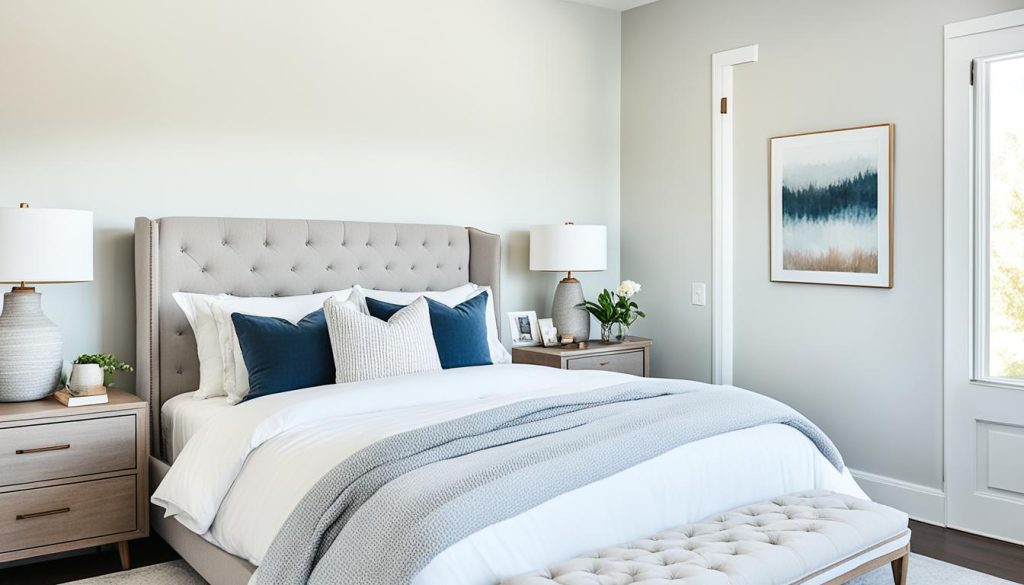
Living a minimalist life can greatly improve your sleep. Studies show that a cluttered bedroom can mess with your sleep patterns, even causing sleep disorders. The more clutter, the more likely you are to have sleep problems.
But, decluttering just a bit each week can make a big difference. It can lead to better sleep and more rest. By getting rid of things you don’t need, you make your bedroom a place for rest and healing.
A 2016 study in the Journal of Environmental Psychology linked clutter to anxiety, which hurts sleep. Going minimalist with your bedroom can ease stress and anxiety. This lets you sleep more peacefully.
People who live minimally tend to be calmer and more grateful. This leads to better mental health and sleep. Focusing on what’s important helps you make a bedroom that supports your sleep and health.
“Minimalism can help manage stress more effectively and build mental resilience, leading to better sleep quality and a more restful slumber, boosting the immune system.”
Choosing a minimalist life and decluttering your bedroom can really improve your sleep. A calm, tidy space means deeper, more refreshing sleep. This can make you feel better overall and improve your life quality.
Starting a minimalist life and decluttering takes time and effort. But, the better sleep you get is worth it. Begin small and work towards a space that helps you relax and rejuvenate. This leads to better sleep and a more productive life.
Fewer Lost Items

In today’s fast-paced world, it’s easy to lose track of our belongings. Americans spend an average of 5-20 minutes every day searching for misplaced items. This can add up to a staggering 30 hours to 5 days per year! Embracing a minimalist lifestyle can help you reduce the time spent hunting for lost items. It can also increase your overall productivity and organization.
Adopting a minimalist approach makes it easier to keep your belongings organized and accessible. With fewer possessions, your living space becomes more streamlined. You can quickly find the items you need. This saves you time and reduces mental clutter and stress from constantly searching for lost objects.
| Scenario | Time Spent Searching for Lost Items | Potential Time Saved with Minimalism |
|---|---|---|
| Owning 100 items | 5 minutes per day | 30 hours per year |
| Owning 50 items | 2.5 minutes per day | 15 hours per year |
The data above shows the significant time savings of a minimalist lifestyle. Owning fewer items makes it easier to track and organize your belongings. This leads to a remarkable increase in your productivity and time management.
The psychological benefits of a minimalist lifestyle are huge. Surrounding yourself with only the essentials gives you a greater sense of freedom and clarity. This allows you to focus on what truly matters to you. This shift in mindset can deeply impact your well-being and quality of life.
In conclusion, embracing a minimalist lifestyle can change the game in reducing lost items and boosting your productivity and organization. Decluttering your space and focusing on essentials can help you reclaim your time, reduce stress, and live a more focused and fulfilling life.
Increased Freedom and Liberation
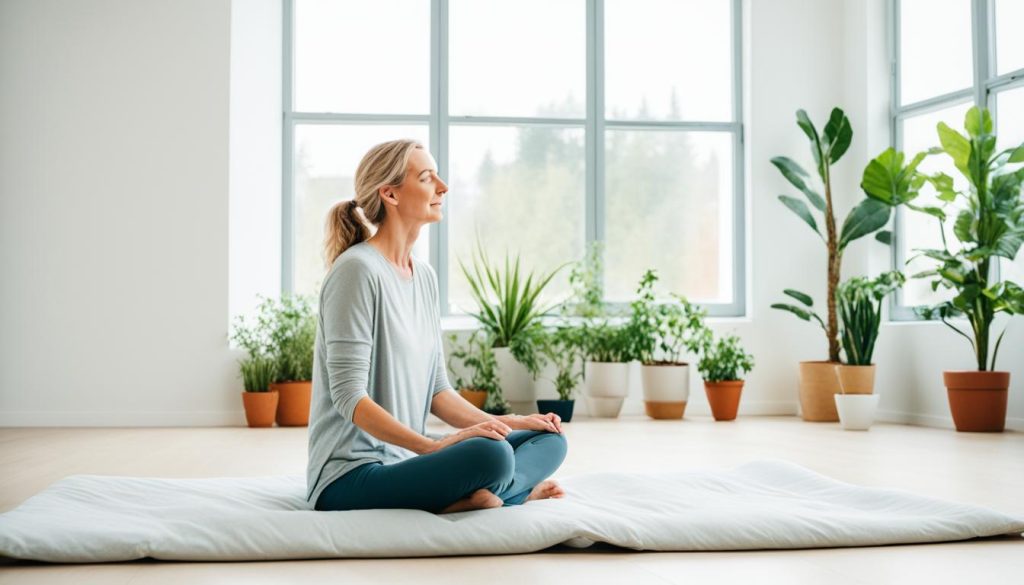
Embracing a minimalist lifestyle brings a new sense of freedom and liberation. Having too many possessions can feel like a weight, holding you back. By letting go of these items, you free yourself from the cycle of consumerism.
Studies show that people who felt trapped by their stuff felt free after going minimalist. They didn’t have to worry about organizing or maintaining their belongings. This gave them more time and mental space for what’s important.
“Minimalism can significantly improve your sense of freedom and liberation.” – Expert on Minimalist Living
Choosing a minimalist life helps you escape the consumerism that fills our lives. You stop chasing after new material goods. Instead, you focus on experiences, relationships, and growing personally. This leads to a deeper sense of happiness and satisfaction.
Minimalism isn’t just about having fewer things. It’s about prioritizing what’s truly important. This change in thinking can greatly improve your sense of liberation and well-being.
The freedom and liberation a minimalist lifestyle offers can change your life. By letting go of too much stuff, you make room for what’s truly important. This lets you live a more meaningful, fulfilling, and liberated life.
More Time and Energy
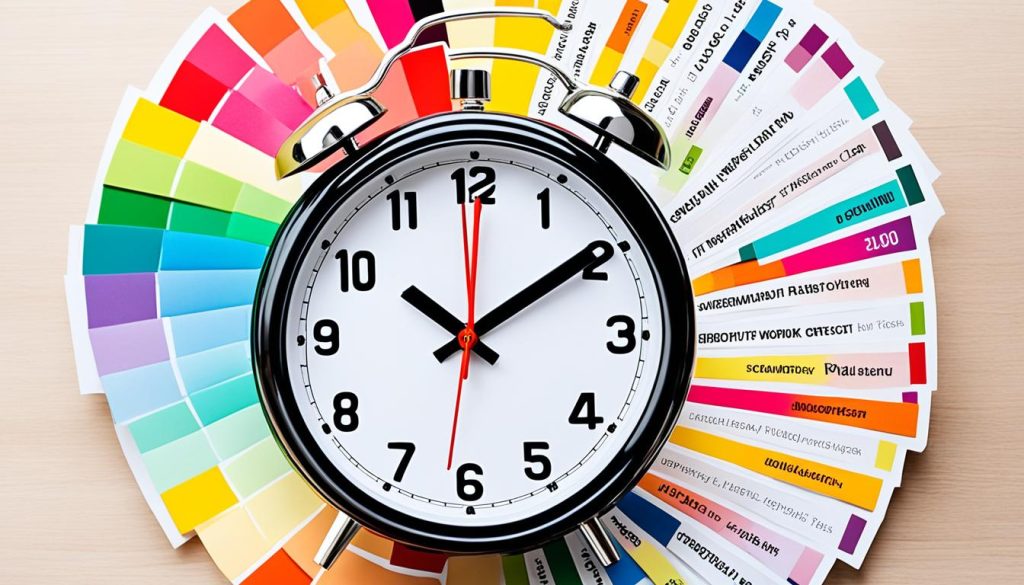
Living a minimalist life can give you more time and energy. When you declutter and simplify, you spend less time on stuff. This means you can focus on what’s really important.
A study found that minimalists, especially those with kids, have more time. Their homes need less cleaning and organizing. They also feel more mentally clear because they spend less time on clothes and stuff.
Minimalism does more than save time. It clears your mind and helps you focus better. With fewer distractions, you can spend more time on what you love. This makes life more fulfilling and productive.
Embracing minimalism changes your daily life in big ways. It helps you simplify everything from your closet to your living space. Each step towards minimalism gives you more time and energy. This lets you live a life full of purpose and joy.
“Minimalism has provided me with lasting value and has paid off tremendously. It has given me more space to grow, think, and enjoy activities with my loved ones.”
By going minimalist, you take back control of your time and energy. You can focus on what’s most important. So, why not start your journey to a simpler, more focused, and happier life today?
Conclusion
Minimalism is a way to make life simpler and focus on what’s important. It looks different for everyone, but the benefits are big. Living minimally can lead to less stress and anxiety, more productivity, and financial freedom.
It also means less cleaning, more well-being, and better sleep. Kids get to play more deeply and freely. There’s more space, and it’s better for the planet. You’ll make healthier food choices and lose fewer items.
Minimalism gives you more time and energy for what you love. It’s about living intentionally and meaningfully. By letting go of the unnecessary, you focus on what really matters.
This could be personal growth, stronger relationships, or helping the planet. Simplified living means making choices with purpose. This way, you enjoy the benefits of minimalism in many areas of life.
Choosing a minimalist life is a personal journey. But the rewards are clear. By valuing experiences over stuff, you gain freedom and clarity. This leads to a more fulfilling life.

